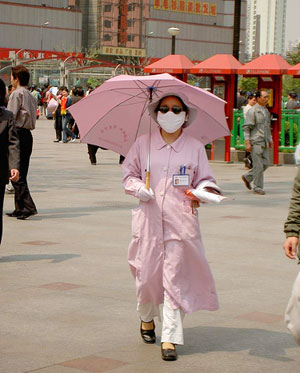After giving birth to our second child, some of my friends from work came to my home to cook jiaozi (dumplings) for my family. They spent several hours chopping vegetables and meat, and using it to fill the freshly made jiaozi dough that was made from scratch and with a dash friendship. After feeding my family, they kindly cleaned my kitchen, without soap. They washed my dishes and wiped down my counters and cutting board (the same one used to chop raw pork) using the same sponges, and left them to dry in the windowsill, bacteria cultures and all! I did appreciate the favor, but I’m still totally clueless as to why my college educated friends did not think it was necessary to clean with soap or disinfectant. (I keep both by the sink.)

Photo: DearTerisa
But I must remember, one of the first things foreigners have to get used to, is the differences in hygiene standards. Especially for Americans, who have been raised to be relentless bacillophobics! (Bacillophobia: Fear of microbes.) We wash our hands religiously, use hand sanitizer at every suspicious door handle and clean our homes with harsh chemicals. In our kitchens, raw meat is handled as if it is leprous. And other people’s saliva is disgusting to us. Really disgusting (unless one happens to be kissing the other person). We typically do not share utensils, cups, bottles or even chopsticks.
But in China, well let’s just say that my butcher tried to welcome my new baby by pinching his cheeks right after he cut our ribs, and some of my male students have shown me how to launch an awesome snot rocket! (I’m not as good as they are. I need more practice but I can’t wait to show my Dad!) And as it turns out, there are certainly some things we clean-freaks can learn from this developing nation.
New research suggests that germs are actually good for us, really good for us. Or course we have always known that what doesn’t kill us, always makes our immune system stronger, but there’s new evidence to suggest that exposure to some pathogens can strengthen us in different ways, even in helping with allergies. According to Dr. Joel V. Weinstock, the director of gastroenterology and hepatology at Tufts Medical Center in Boston, the immune system at birth, “is like an unprogrammed computer. It needs instruction.” In the same New York Times article, Weinstock asserted that public health measures like cleaning up contaminated water and food have saved the lives of countless children, but they “also eliminated exposure to many organisms that are probably good for us.”
One of the more interesting, and more stomach turning things about this fact is that it’s not just any kind of bacteria that makes us healthier, but it seems to be exposure to “intestinal worms” that can make a big difference in the immune system.
“In Gambia, the eradication of worms in some villages led to children having increased skin reactions to allergens, Dr. Elliott said. And pig whipworms, which reside only briefly in the human intestinal tract, have had “good effects” in treating the inflammatory bowel diseases, Crohn’s disease and ulcerative colitis, he said.”
This might explain why some expats who have lived with food allergies their whole lives in their home countries, find their symptoms die down after some time in China. In an earlier New York Times article, Weinstock found compelling evidence for the power of the “intestinal worm.”
Research results published in 2005 found that sufferers of Crohn’s disease benefited from regular ingestion of microscopic worm eggs (sorry). Many experienced alleviatied symptoms and some went into complete remission. Because Crohn’s disease belongs to the same family of diseases as the dreaded Irritable Bowel Disorder, the results of this study may have a wide ranging effect in the treatment of this common, but unfortunate ailment.
The results of this study have inspired others to study the effects of worms on everything from hay fever to asthma. In the future, doctors may be prescribing worm eggs to deal with some modern sicknesses. So while you’re in China, don’t be so quick to judge the hygiene standards of a different culture. The Chinese are doing just fine with their untreated water and empty soap dispensers. And while you’re at it, put away that hand sanitizer you smuggled in from the outside world and enjoy some food at a local “greasy chopstick.” (I just hope you remembered to pack some Imodium AD with your Purell.)
***
Related Articles:
All Shot Up: Which Vaccines Do I Need in China? (Part1)
China disinfects town where plague killed 3rd
Going Organic in China -Beijing LOHAS
Warning:The use of any news and articles published on eChinacities.com without written permission from eChinacities.com constitutes copyright infringement, and legal action can be taken.
All comments are subject to moderation by eChinacities.com staff. Because we wish to encourage healthy and productive dialogue we ask that all comments remain polite, free of profanity or name calling, and relevant to the original post and subsequent discussion. Comments will not be deleted because of the viewpoints they express, only if the mode of expression itself is inappropriate.
Please login to add a comment. Click here to login immediately.